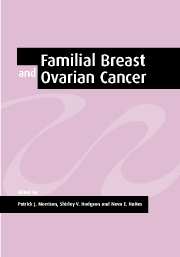Book contents
- Frontmatter
- Contents
- List of contributors
- Foreword by Helena Kennedy
- Preface
- Acknowledgements
- Part 1 Molecular biology and natural history
- 1 Introduction
- 2 Overview of the clinical genetics of breast cancer
- 3 Cowden syndrome and related disorders
- 4 Overview of the clinical genetics of ovarian cancer
- 5 Ovarian and breast cancer as part of hereditary non-polyposis colorectal cancer (HNPCC) and other hereditary colorectal cancer syndromes
- 6 The natural history of hereditary breast cancer
- 7 Pathology of the breast and ovary in mutation carriers
- 8 Risk estimation for familial breast and ovarian cancer
- Part 2 Screening
- Part 3 Management
- Index
6 - The natural history of hereditary breast cancer
Published online by Cambridge University Press: 24 August 2009
- Frontmatter
- Contents
- List of contributors
- Foreword by Helena Kennedy
- Preface
- Acknowledgements
- Part 1 Molecular biology and natural history
- 1 Introduction
- 2 Overview of the clinical genetics of breast cancer
- 3 Cowden syndrome and related disorders
- 4 Overview of the clinical genetics of ovarian cancer
- 5 Ovarian and breast cancer as part of hereditary non-polyposis colorectal cancer (HNPCC) and other hereditary colorectal cancer syndromes
- 6 The natural history of hereditary breast cancer
- 7 Pathology of the breast and ovary in mutation carriers
- 8 Risk estimation for familial breast and ovarian cancer
- Part 2 Screening
- Part 3 Management
- Index
Summary
Summary
Determining the outcome following hereditary breast cancer is one of the key questions in clinical breast cancer genetics. There is increasing evidence that BRCA1- and BRCA2-related breast cancers are distinguishable from non-hereditary breast cancers: hereditary cancers demonstrate gene expression profiles and somatic genetic changes that are distinct from those seen in sporadic breast cancers and feature histopathological and immunohistochemical characteristics usually associated with a worse prognosis. Despite these findings, conflicting data exist as to whether the prognosis of hereditary breast cancer differs from that of sporadic cases. Some of the discrepancies may be explained by methodological differences or biases. However, no mutation-based studies have shown a survival advantage for BRCA1/2 mutation carriers and several unrelated studies have recently found that the presence of a BRCA1/2 mutation was an independent poor prognostic factor. Regarding the risk of further or recurrent breast cancer, it is established that the risk of contralateral breast cancer is significantly increased in breast cancer patients harbouring BRCA1/2 germline mutations, but surprisingly, during the first 5 years after diagnosis, an increase in the rate of ipsilateral breast recurrences has not been found. These data suggest that radiation may protect against, or at least delay, ipsilateral recurrences.
Introduction
Up to five per cent of breast cancer cases are hereditary and germline mutations in the breast cancer predisposing genes BRCA1 and BRCA2 may account for 65–80% of the hereditary cases (Ford et al., 1998; Rahman and Stratton, 1998).
- Type
- Chapter
- Information
- Familial Breast and Ovarian CancerGenetics, Screening and Management, pp. 81 - 107Publisher: Cambridge University PressPrint publication year: 2002



